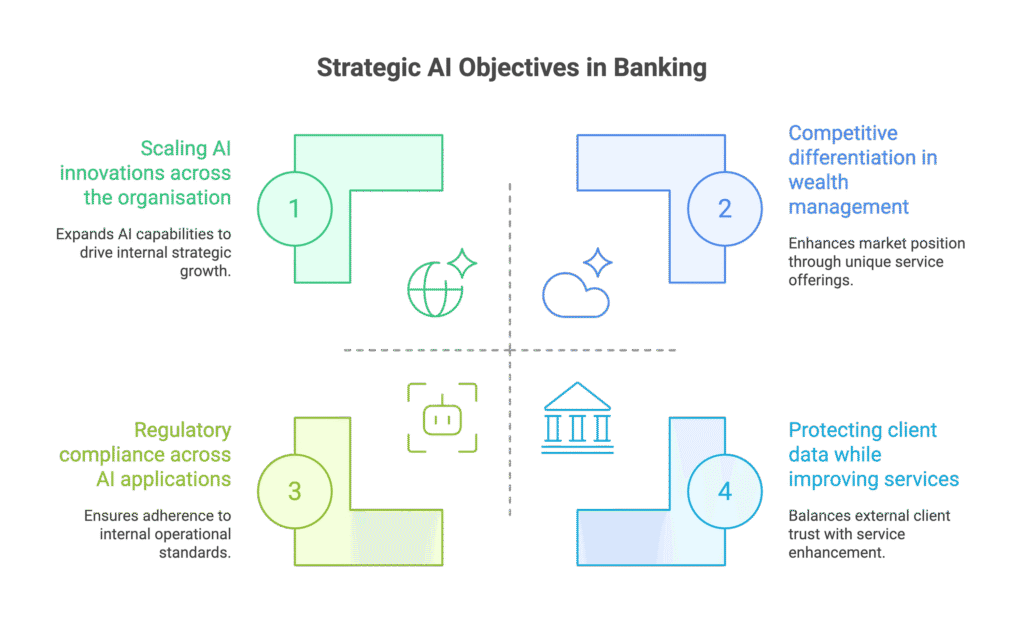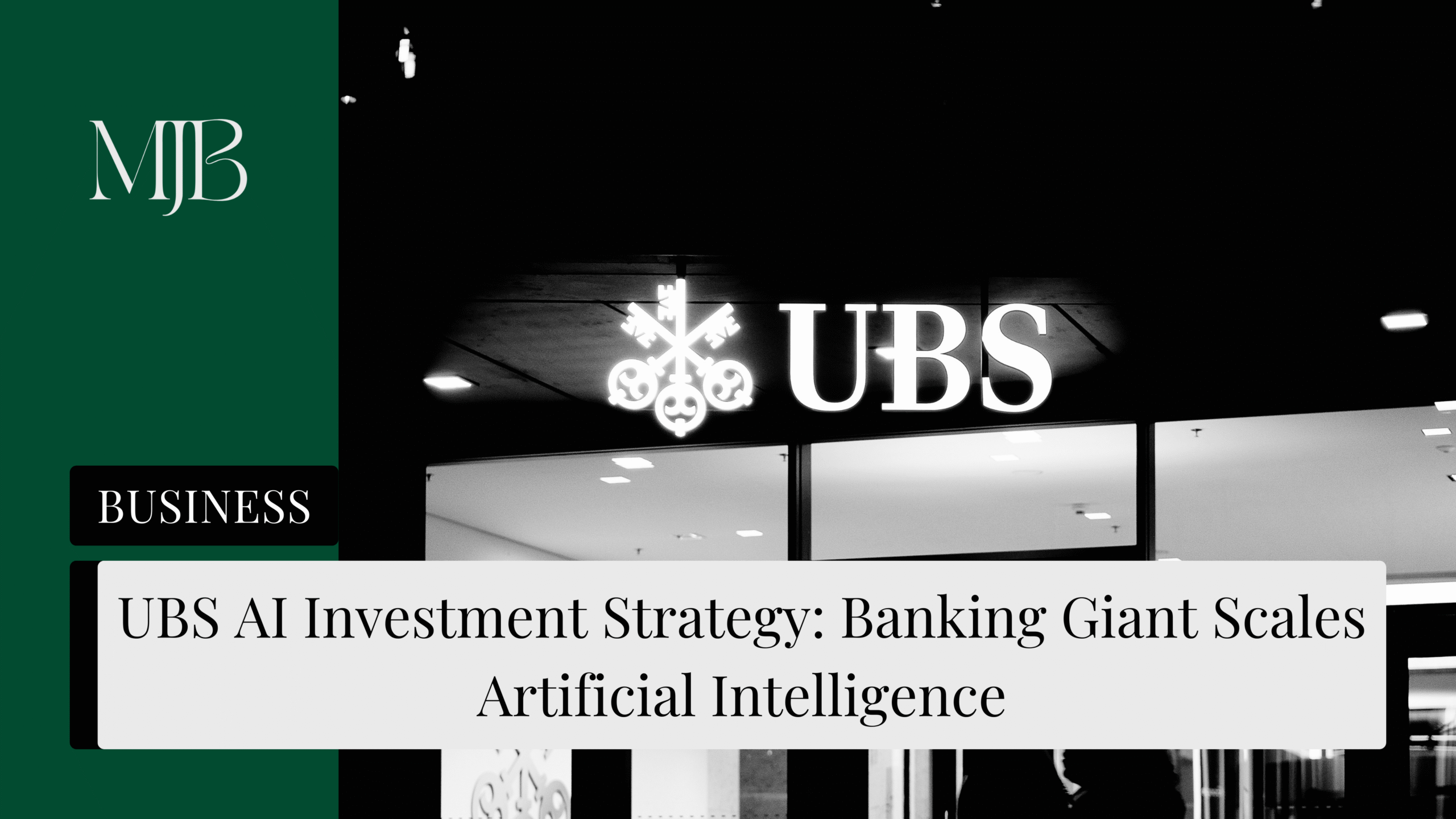Introduction
What happens when the world’s largest wealth manager decides AI isn’t just a buzzword—it’s their future? UBS just answered that question with a strategic AI investment in enterprise platform Domino Data Lab, expanding their five-year partnership into new territory.
This isn’t your typical “exploring AI possibilities” announcement. UBS is building serious artificial intelligence infrastructure across wealth management operations, aiming to become what they call an “AI-enabled institution.” With AI in banking becoming the sector’s biggest transformation since online banking, UBS’s move signals they’re not just keeping pace—they’re setting it.
Why UBS Chose In-House AI Development Over Third-Party Solutions
The AI banking revolution has sparked a crucial debate: build artificial intelligence models internally or buy them from vendors. UBS picked the DIY route, and their reasoning is solid.
Thomas Robinson from Domino Data Lab explains: vendor AI models might accelerate initial deployment, but they “confer no competitive advantage and increase risk.” For wealth management giants handling trillions in assets, that’s a deal-breaker.
The RiskLab Foundation: Five Years of AI Banking Innovation
UBS’s AI strategy builds on RiskLab, their internal artificial intelligence model development platform that’s been operating since 2019. This isn’t experimental territory—it’s proven ground for responsible AI innovation in financial services.
The approach emphasises “responsible innovation,” balancing speed with regulatory compliance. Translation: move fast, but don’t break things (especially when banking regulators are watching every move).
AI Banking Trends 2024: The Broader Financial Services Revolution
UBS’s AI investment reflects larger artificial intelligence trends transforming banking in 2025. The financial sector is experiencing what experts call an “AI awakening,” with institutions racing to implement generative AI solutions.
FNZ Joins the AI Banking Movement
Just this week, FNZ launched FNZ Advisor AI, targeting financial advisers with generative artificial intelligence tools. Their focus: streamlining client meetings while tackling AI hallucinations—those moments when AI generates convincing but incorrect information.
The Strategy Reality Check
Here’s the plot twist: despite AI hype in banking, a Forvis Mazars report revealed that while 100% of surveyed executives claim to be “AI-ready,” only 43% have comprehensive AI strategies.
Even more telling? Just 51% have piloted artificial intelligence solutions. That’s significant talk without much implementation—highlighting why UBS’s infrastructure-first approach stands out.
What UBS’s AI Investment Means for Wealth Management
UBS’s partnership with Domino Data Lab suggests they’re playing the long game in AI banking. Instead of flashy chatbots, they’re building foundational artificial intelligence capabilities for everything from risk assessment to personalised client recommendations.
Stephan Hung, UBS’s head of group functions technology, frames it as leveraging AI for “smarter, faster, and above all, more responsible innovation.” The emphasis on responsibility isn’t accidental—in wealth management, trust is everything.
The Competitive Advantage of AI-Enabled Banking
With AI value creation potentially reaching $1.2 trillion by 2027, UBS’s strategic positioning makes sense. By controlling their AI development pipeline, they can:
- Maintain competitive differentiation in wealth management
- Ensure regulatory compliance across all AI applications
- Scale artificial intelligence innovations across their entire organisation
- Protect client data while improving personalised services

Future of AI in Banking: Key Takeaways
UBS’s AI investment in Domino Data Lab isn’t just about keeping up with fintech disruptors—it’s about leading the artificial intelligence transformation in wealth management. By prioritising in-house AI development over quick vendor solutions, they’re positioning themselves for sustainable competitive advantage while managing operational and regulatory risks.
As generative AI becomes the most important banking trend for 2025, UBS demonstrates how established financial institutions can embrace artificial intelligence responsibly and strategically.
FAQ
Q1: Why did UBS invest in AI technology instead of using existing banking software?
A: In-house AI development provides competitive advantage and reduces operational risks. Vendor solutions might be faster to deploy but don’t differentiate UBS from competitors and can increase security vulnerabilities in wealth management.
Q2: What is UBS’s RiskLab AI platform?
A: RiskLab is UBS’s internal artificial intelligence model development platform operating since 2019. It focuses on responsible AI innovation with robust governance, ensuring regulatory compliance while scaling AI across banking operations.
Q3: How does UBS’s AI strategy compare to other banks in 2025?
A: UBS takes an infrastructure-first approach to AI banking, building foundational artificial intelligence capabilities organisation-wide. This contrasts with competitors focusing on specific AI products or relying heavily on third-party solutions.
Q4: What risks do banks face with AI adoption?
A: Poor-performing AI models can damage customer trust, increase operational costs, create regulatory compliance issues, and expose banks to significant fines. Financial institutions must balance artificial intelligence innovation speed with responsible implementation.
Q5: Are banks ready for widespread AI implementation?
A: While 100% of surveyed banking executives claim AI-readiness, only 43% have developed comprehensive artificial intelligence strategies. The banking industry shows more enthusiasm than actual AI implementation, making UBS’s strategic approach notable.
DISCLAIMER
Effective Date: 15th July 2025
The information provided on this website is for informational and educational purposes only and reflects the personal opinions of the author(s). It is not intended as financial, investment, tax, or legal advice.
We are not certified financial advisers. None of the content on this website constitutes a recommendation to buy, sell, or hold any financial product, asset, or service. You should not rely on any information provided here to make financial decisions.
We strongly recommend that you:
- Conduct your own research and due diligence
- Consult with a qualified financial adviser or professional before making any investment or financial decisions
While we strive to ensure that all information is accurate and up to date, we make no guarantees about the completeness, reliability, or suitability of any content on this site.
By using this website, you acknowledge and agree that we are not responsible for any financial loss, damage, or decisions made based on the content presented.






